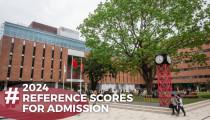
Sept 2024 Entry
3 years (Full-time)
5 years (Part-time)
51
What's New
Programme Aims
This programme is aimed at developing designer-researchers who can conduct practice-based design research and who have a good understanding of how to extend their professional practice. Our students can make a substantial contribution to society through the knowledge they have gained and can offer novel solutions to societal problems by accessing the potential that has previously lain dormant within them.
The programme strongly encourages the development of analytical capabilities, in addition to design skills, by instructing students in a variety of research approaches, and promotes an attitude of collaboration.
Characteristics
-
Practice-based research: Advancing various design research directions for societal development and system changes.
-
Trans-disciplinary: The application of research knowledge related to design across a wide range of disciplinary boundaries, which can influence the design industry and communities of the future.
-
A flexible programme structure and outcome: Customisable to meet the ever-changing demands of the market and to provide students with extensive design knowledge.
Students will graduate with a Doctorate of Design (DDes) after successfully completing all subjects (as listed in the curriculum) and a thesis, and can then use the title ‘Dr’.
On successful completion of the programme, the graduates will be able to:
a) Plan for applied and practice-based research and individual investigations by identifying their professional interests and by achieving specific design outcomes.
b) Produce well-structured professional work that reflects their abilities in composition, articulation and ethos, and work that is suitable for international publishing in scholarly journals, other competitive distribution channels and exhibition venues.
c) Develop a thesis that satisfies the standards of the university and makes a significant intellectual contribution to the subject of Design research and to society in general.
d) Create constructive strategies for obtaining innovative solutions to challenging problems in complex environments.
e) Become self-regulated critical thinkers whose decisions at the executive level can affect society.
f) Translate design inputs into an attractive and compelling narrative that can impact the future well-being of users.
g) Leverage the professional knowledge and skills of a supervisor and an effective leader’s mindset of creativity and innovation; constantly seek opportunities and changes to analyse and improve solutions in respective fields.
h) Pursue knowledge, leadership qualities and the characteristics and understanding of design thinking and problem-solving, in collaboration with other professionals, to develop organisational strategies.
i) Have an awareness of the impacts of design in the new era and evaluate these impacts in design projects, through which meaningful success can be achieved.
Students are required to complete 9 Core Subjects, 2 Elective Subjects and 3 Thesis Subjects.
Core Subjects
- HTI6081 Research Ethics for Doctoral Students
- SD6101 Practice-Based Design Research
- SD6002 Design Research Methods
- SD6102 Design Vision Expedition
- SD6704 Practicum
- SD6103 Roundtable Leadership
- SD6700 Design Research Seminars
- SD6800 Guided Study in Design Study 1
- SD6801 Guided Study in Design Study 2
Elective Subjects
- SD6201 Digital Design Culture
- SD6202 Applied Design Research Methods
- SD6203 Design Intelligence
- Other subject(s) from the MDes programme in the School of Design
Thesis Subjects
- SD6104 DDes Thesis I
- SD6105 DDes Thesis II
- SD6106 DDes Thesis III
51
Prof. Henry Ma
The DDes programme accommodates the needs of mature and experienced industry professionals, leaders, and educators already holding a Master’s degree in relevant disciplines.
The normal minimum academic qualification required is a Master’s in related disciplines or equivalent. All students must meet one of the following criteria:
-
A minimum of 1 year’s full-time teaching experience in an art or design profession in a recognised post-secondary institution, plus at least 1 year’s work experience at the supervisory or managerial level in art, design or related industries; OR
-
Substantial and relevant working experience (normally not less than 3 years at the leadership level in practice-based design or related industries); or at least 3 years of teaching experience in art or design professions.
If you are not a native speaker of English, and your Bachelor's degree or equivalent qualification is awarded by institutions where the medium of instruction is not English, you are required to meet one of the following requirements#:
-
A score of 80 or above in the Test of English as a Foreign Language (TOEFL) Internet-based test; OR
-
An Overall Band score of 6.5 or above in the International English Language Testing System (IELTS) Academic module.
# All English-language test scores are considered valid for 2 years after the date of the test.
Individual cases will be considered on their own merit by the department. Applicants may be required to attend an interview to demonstrate their language proficiency.
For further information, please contact us via email: ddes.sd@polyu.edu.hk
4 for local students
7 for non-local students
HK$9,400 per credit for local and non-local students
(A personal resume (CV) covering the applicant’s education, employment experience, professional qualifications, noteworthy achievements, and any other relevant factors)
(Including a self-introduction, a discussion of career aspirations, and the reasons for pursuing the studies in this programme)
Portfolio
(A portfolio providing examples of the applicant’s professional experience, consulting reports, etc.)





